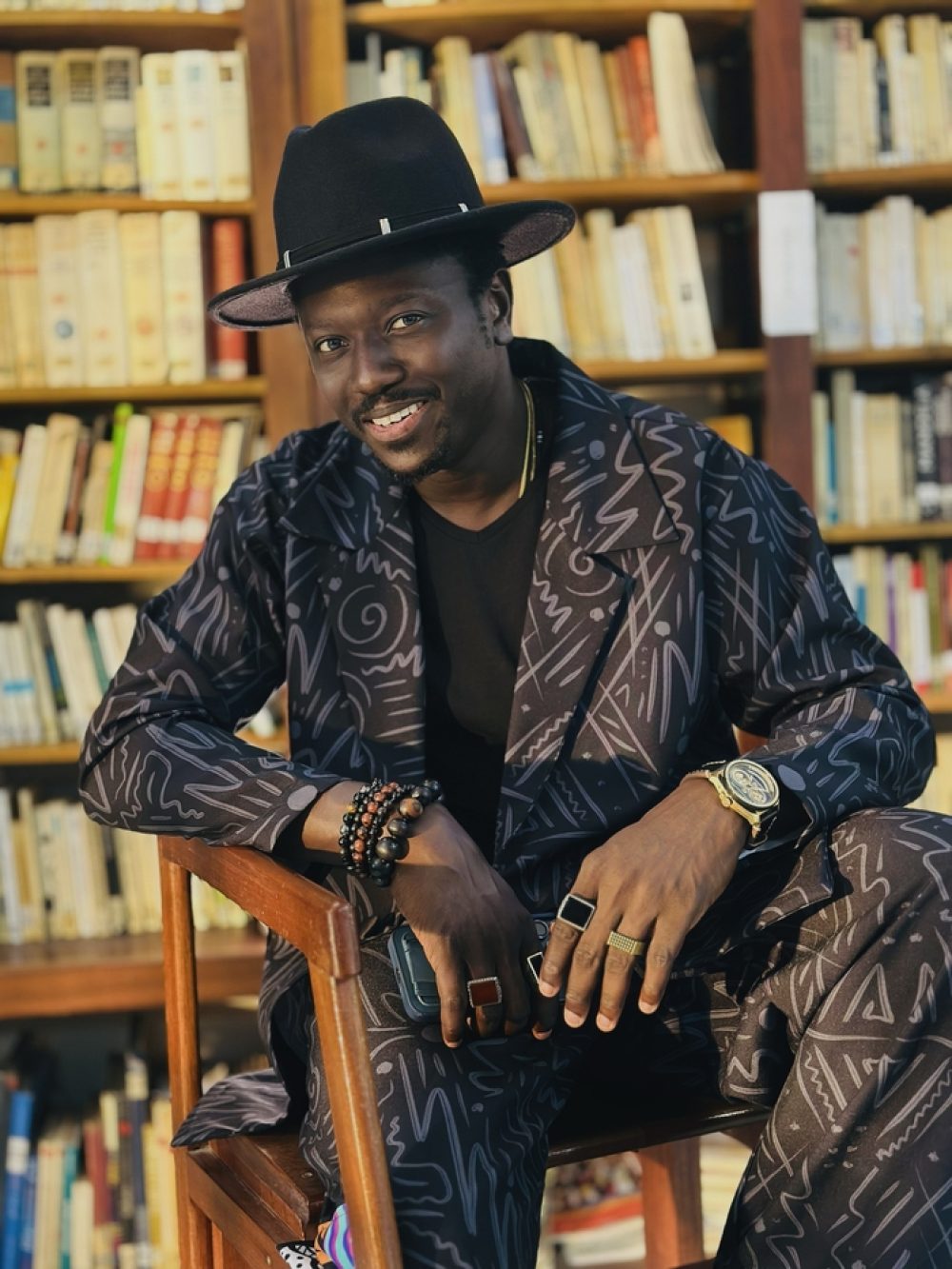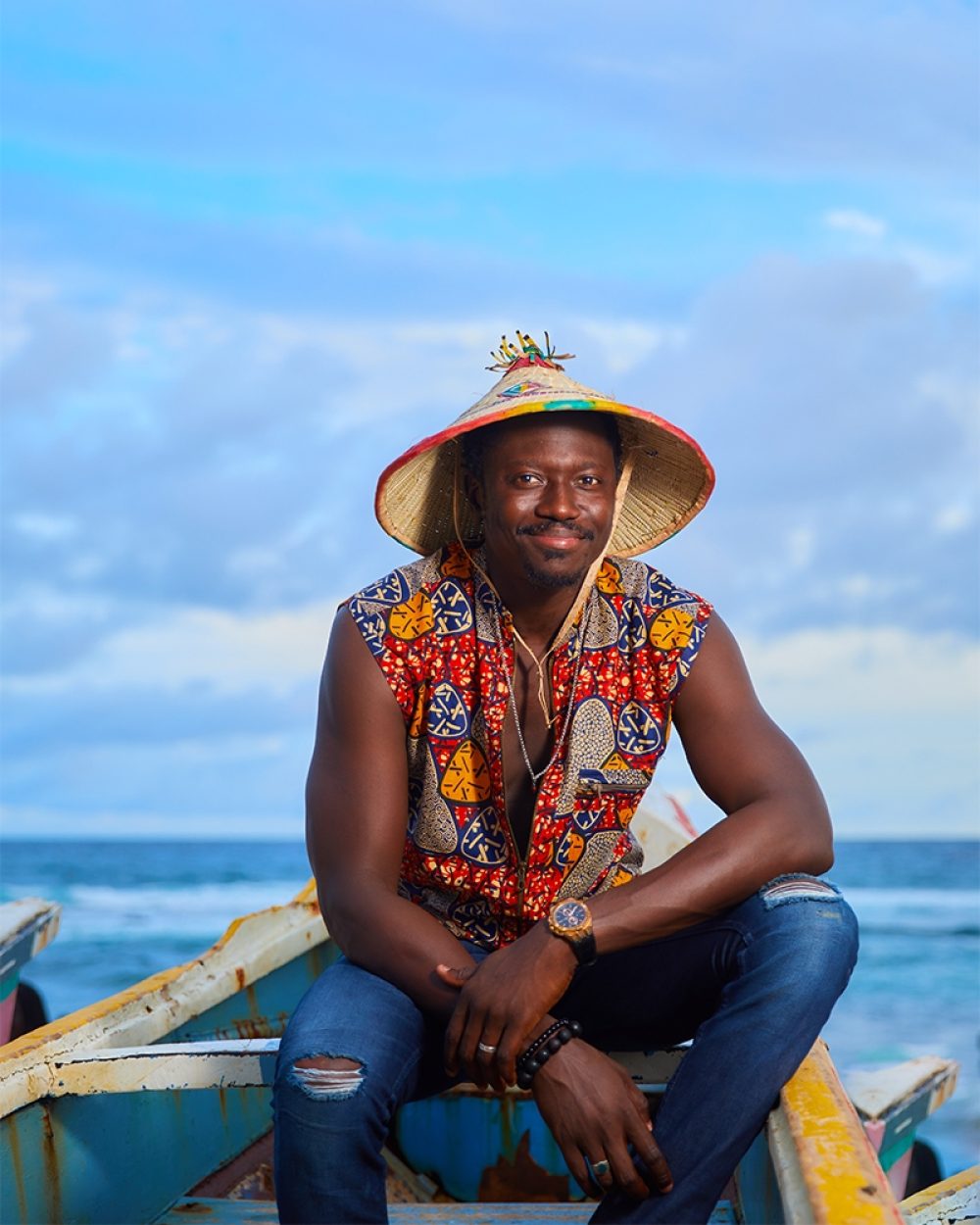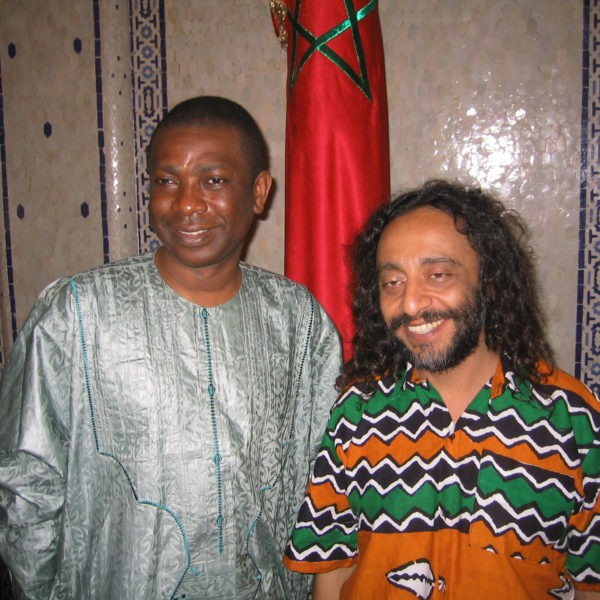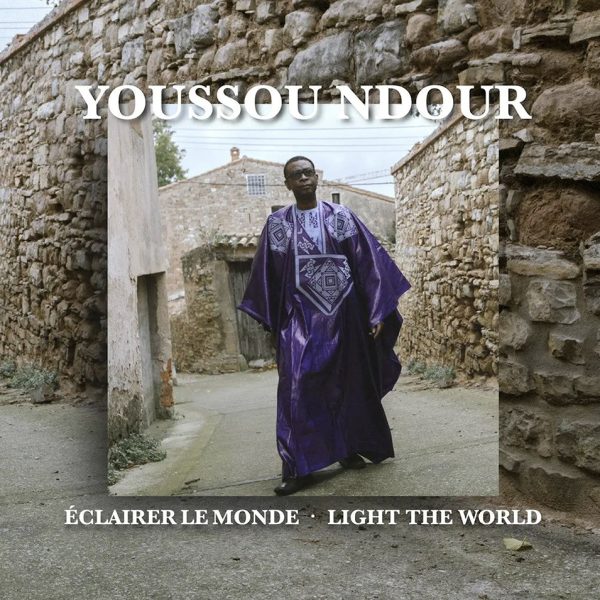Xam Xam is the first video released on April 10 by Senegalese Cheikh Ibra Fam, the former Orchestra Baobab singer and instrumentalist, from his upcoming sophomore album, Adouna (“Life”), set for release in October 2025. Fam's tour takes him through New York City on June 24 at DROM.
From the first panoramic patchwork mosaic drone shot of Dakar´s rooftops to the resting pirogues, fishing boats, parked on the shoreline, this is a beautifully executed music video that complements a memorable song.
The mastery of cinematographer Oumar Ndiaye, skillful direction, and production by Mao Sidibe, make Xam Xam a cinematic exploration, a collaboration of artists, rather than a mere music video. A feat that only a personality like Cheikh Ibra Fam can accomplish with his unmistakable star power. Strap yourself in for a year filled with audible and visual treats from this young new artist, as he releases a series of videos for his new album, illustrating his earned place as a budding star in African contemporary music.
Barely out of "madrasa", Koranic school himself, Chiekh Ibra Fam introduces us to layers of meaning with Xam Xam, which is both playful and philosophical. Not your usual run-of-the-mill single release from the ever-expanding and exploited world of African pop music, where some artists drop a hot remix of the same beat every hour. Xam Xam is slow simmering, with permission to cook fully from the inside rather than just the surface. Add to this recipe a visually arresting music video with a nuanced color palette by lighting designer Mamadou Dia, who allows the light to saturate the characters and the makeup of Aby Sowart, who has turned every humble character into an icon. All of these elements are in place before Cheikh Ibra Fam even opens his mouth to sing, as a character, a modern marabout or koranic teacher, of the order of Baye Fall. What is Baye Fall? We will get to that soon.
The assignment for the music video was to bring a youthful energy to augment the musical message to youth to embrace knowledge, and they executed as a team with finesse. Frame by frame, the storytelling has movement, where little details in action and direction of characters and themes lift the song to a special place. The destination we finally arrive at is great music, where we will beg to stay so that we can relive all the details of joy and light.
The song is well-crafted with arresting musical motifs beginning with the trumpet riff, by legendary Jacob Edgar, proprietor of the Cambancha label, and curator of Putamayo World Music. With years of global experience in curating some of the best artists the world has to offer, he knows a world-class act when he hears one, and Cheik Ibra Fam fits that bill.
From the get-go and the whole production is meticulously executed through the clever casting of a very young boy to mime the trumpet riff of Jacob Edgar. Youth is used as a metaphor in many other instances in the video, and the color palette screams pre-k with eye-popping art direction, presented as a cornucopia of sunflower yellows, bright turquoise, and hot reds, as counterpoint to syncopated rhythms beautifully accented with the kora.
The young lead dancer Zahra, featured in the music video, is fluid, and her exuberance shines through. There are very few videos that can translate a youth empowerment message without being boring or didactic. This video shares these messages in subtle, fun details, offering an example of a well-thought-out music video, brought to life by Jean Decort Panama & Uniquely Global, Minneapolis, USA.
On the surface, the song is described as “a song about knowledge, legacy, and hope for the future”, says his Cumbancha label, yet the song has much deeper roots.
After 6 years singing with the legendary Orchestra Baobab, Cheikh Ibra Fam launched his solo career in 2022. He was nurtured in an organic African mystical Islamic tradition and household, where all life is directed by the Servant of the Messenger and Serigne Touba, or "Sheikh of Touba", a Sufi saint, religious leader, and freedom fighter in Senegal, and the founder of the Mouride Brotherhood (the Muridiyya),Cheikh Amadou Bamba (1853-1927). This prophet, who practiced non-violent resistance, is said to have performed miracles and walked on water, wrote over 1000 books in Classical Arabic, primarily focusing on the Quran and Hadith. Additionally, he composed thousands of poems praising God and the Prophet Muhammad, and produced books on Islamic jurisprudence and Quranic theology.
Forced into exile to Gabon by the French colonizers, today the manuscripts of Cheikh Amadou Bamba are located at the library of the Great Mosque of Touba, the Mecca of Senegal, and destination of the annual hajj for Baye Fall, called the Grand Magal recognized as "one of the most popular pilgrimages in the world," with over 3 million participating in 2011, so the numbers have probably doubled since.
The Sufi roots of Bamba were influenced by the teachings of Persian (Iranian) Sufi Muslims, including mystic Abū Ḥāmid al-Ghazālī (1058-1111), whose Islamic scholarship and spiritual texts address critical human dilemmas in his seminal work The Ecstacy of Performance. This collection of essays includes ruminations on knowledge, of self, of God, of this world, and of the next world, among others.
The chapter that seems most applicable when being introduced to Baye Fall philosophy is chapter 6, called the Alchemy of Happiness. In this chapter, al-Ghazālī's teachings on music and dancing correlated directly to Baye Fallism, where the relationship between faith and action is symbiotic, and that “music and dancing do not put into the heart what is not there already”. He linked music and melodic harmony as creating a natural ecstasy in man, arousing earthly, sensual, spiritual, and divine “feelings” of the participant, and that this state of ecstasy brings them closer to God. He was a revolutionary and a heretic, like Amadou Bamba, to traditional Islam and colonialism, which both claimed the lawlessness of music and dancing.
For Africans, the two cannot be separated as worship is connected to belief, and embodiment is practice, witnessed in any black population globally. The incorporation of music and dancing in religious practice is a divine manifestation of the presence of the spirit world and the God within us and around us, evidenced in Candomblé, Vodou, and Santería.
The philosophy of al-Ghazālī, Cheikh Amadou Bamba, and his famous disciple Baye Fall, all challenged theological authorities and what they all claimed were that religious abstract proofs and systems of classifications stifle the divine nature of (wo)men to hear, sing, and dance to music. Africa and Africans have always been spiritual, and al-Ghazālī´s lifelong quest and non-traditional contributions to Islamic scholarship for a spiritual revival found fertile ground in Senegal and, during colonialism, found residence with the teachings of Amadou Bamba. Today, Baye Fall, whose name is derived from Cheikh Ibrahima Fall, one of Amadou Bamba's most prominent disciples, is a society of 5 million strong. The influence of Cheikh Amadou Bamba has stood the test of time with foreign occupation and the challenges of the colonial project.
Young Cheikh Ibra Fam is a tour de force of positive energy, exuberance, and undeniable swag, but he is clear that he carries these tensions and legacies with him and does not shy away from passing on his faith in the traditions of Baye Fall onto the next generation.
Famous Baye Fall deeply connected to Cheikh Ibra Fam include Youssou N'Dour, who paid homage to Cheikh Amadou Bamba and Baye Fall in his 2004 iconic album Egypt, with the unforgettable single Touba, in praise of the spiritual home of the Baye Fall. His real-life mentors include Orchestra Baobab and Cheikh Lo, whose Bamba Sunu Goorgui is a classic in Senegal and around the world. Cheikh Ibra Fam´s musicality is solid, having studied not only the ancient instruments of Mali and Senegal, but after a four-year conservatory experience in Italy, he is a master of brass instruments.
Cheikh Ibra Fam’s entire forthcoming album is inspired by these historical backdrops, cultural memories drawn from his family, and the musical luminaries who have guided him through his becoming. He is very clear about who he is and where he is going and how “Baye-Fallism, as he likes to say, influences his music. Listeners and watchers can expect a rich, classy act by the end of the year.
Stay tuned for a series of reviews of the songs and influences on the upcoming album Abouna (Life), and here is a taste of one of our spirited conversations about his new single, Xam Xam.

Mukwae Wabei Siyolwe: How are you?
Cheikh Ibra Fam: Good, good, good!
Great! How are you? Where are you?
I’m in Dakar, West Africa.
What are you doing? You're shooting your new video.
Yes, we're going to start showing two new videos. And, the staff, everybody, they are all ready. So I just have a little break to have my coffee and enjoy the sun.
What's the new song that you're recording the video for?
Yeah, we're gonna shoot a video for the new song called "Numbolo." Numbolo means united, like the United States of America. So I'm calling it United of Africa, to get success together for Africa.
Absolutely. I understand that Adouna is the title of your new album that's coming out later this year? Tell me about the title of the New Album, Adouna.
The new album is Adouna, which means life. So every song in this new album reflects life. So, inside you can see an example. Xam Xam means knowledge. In French, so there is a Numbolo that we are shooting Numbolo in Senegal (right now). Numbolo means, “Let's join United”. Let's join our energy. Our effort together for a better Africa.
That's great. And so what was the inspiration to decide that it was time, because you're so young? And this is the beginning of your career, and you already want to do something so beautiful and big. What was the inspiration for you to decide to launch something so large?
Yeah, something so large is just, you know, the ambition that I always have before. When I start doing music, you know, when you start doing music, you just have a dream. You have a dream. The dream is just limited to. I want to be a singer, or I want to be famous. But after you realize that music is your key to open many doors in this world in this life, and the doors that I want to open are the doors of sunshine and sharing my messages about Africa, about what we need, what Africa means to represent Africa, too, because, if you know I'm doing world music, but there is less artists who, doing world music, who who get access to the world to spray their their messages, to to share their. You know the vision that I want people to see from Africa.

Wonderful. So much of what you're doing is tied to your upbringing and to the philosophy of Baye Fall and the philosophy of Cheikh Amadou Bamba, of the community, and sharing and love, and peace. How much has that inspired you?
It´s from the beginning. If you heard my name, Cheikh Ibra Fam is a reality, and the “Mbayefallism” helped me to have the inspiration, because you cannot have inspiration without trying to be humble. If you're humble, you have aspiration. If you're humble, you listen to everybody. So then you can have knowledge. You're calmer because you´re connecting to your soul, you're connecting to everybody, to nature, and Baye Fall is Sufism and is a great philosophy of life, and that reflects in my music, because I always try to show that. You know, kids in my music video, because kids are the most honest in this world, because you know there is no hate in their hearts. So yeah. And Baye Fall is the way to connect to the world, to nature. Now, when you breathe, you feel you catch the vibes. If you are a bifur, and if you listen to all my music, you know, since I started doing this, you can. You can see the humility inside. So it's everything for me. Baye Fall works for God. But where is God? You don't see God in front of you; he's not an object, but God is people.
Absolutely.
Without any exception. You know there is no difference if this man is white, or this man is black, or yellow, so.
Like this person is a man, and this person is a woman. That's what I love about Baye Fall.
Yeah, sometimes when I see the Rastafari, you know they have locks, Bob Marley had dreadlocks. But Cheikh Ibrahima Fall was the first one to have dreadlocks in this world before Bob Marley.
Yes, yes.
And this story is before Rastafari. This story is before Bob Marley. So that's what we try to highlight. We try to highlight these things to the world to know that there's a culture. There's the Perksha, because the Baye Fall movement has percussion. We play percussion. There is a fashion, because we dress like Cheikh Lo. If you see Cheikh the way he dresses. There is something very important, we wear the belt we wear shows that there is a philosophy behind the belt is very important. It means before being someone important, you need to work hard in this world. That's why we had the bells here. So, Baye Fall is a great philosophy of life.
Baye Fall are a nation of people saved by one man in a pre-colonial struggle, who remembered the old ways of community. Music and dance are such huge components of African unity, and the celebration of life as opposed to piety as a form of social control.
Joy, the joy that you can have. Sometimes you have money, but you're not happy. Sometimes you have a nice car, but you're not happy. You have a nice house, you're not happy, or you can be inside a nice house and feel sad. So the philosophy of you know brings you to the joy. To know what we need to be happy is just immunity, because if you're humble, everybody is enough. Everything is enough for you. Everything is enough for you. You're not looking for something bigger, because something big or something smaller. That's only in your eyes. Who can say this is big? That's only in your eyes. Who can recognize? Oh, this is too small for me. But if you are a Baye Fall, you don't see with your eyes, you see with your heart. Everything is big with the heart.

You are a hundred miles different from many young musicians today. I'm excited that you have this beautiful spiritual foundation to your music.
We appreciate that.
You are the new generation of Baye Fall, socially conscious, spiritually conscientious, and emotionally mature artists.
Thanks so much.
We need it in Africa right now.
Thanks. I appreciate it.
I know you will never sell out, you have too many ancestors on your back to be lured by money. So much of being a musician in the West is about making money.
It's a business. It's a show business.
We are so excited at Afropop and thrilled to partner with you and see you grow. We look forward to helping you launch this new album, and thank you so much.
Me, too. I need to thank you. I need to thank Afropop. I need to thank everybody who's going to watch this video. You know. I think the most important thing in this world is to connect to your soul, to be yourself, because when I started at the beginning doing music, I was thinking I'm American. I was, I would like to look like an American, but in the end, I said, I'm African, and I want to keep Africans from forgetting their past. We have a big work to do, which is to show everybody who we are. It's very important, you know, to be proud, but showing it through love, showing it through humility, showing it with a smile, because, you know, we are not savages. We are cool, we are kind. We are calm when we say in French, savoir, which means knowledge. In Africa, everything is savoir, knowing how to talk to old people, knowing how to say the truth, without hurting anybody, is what we all need, actually, for the new generation in Africa, and thank you so much.
Absolutely. Enjoy the journey.
Related Audio Programs
Related Articles














